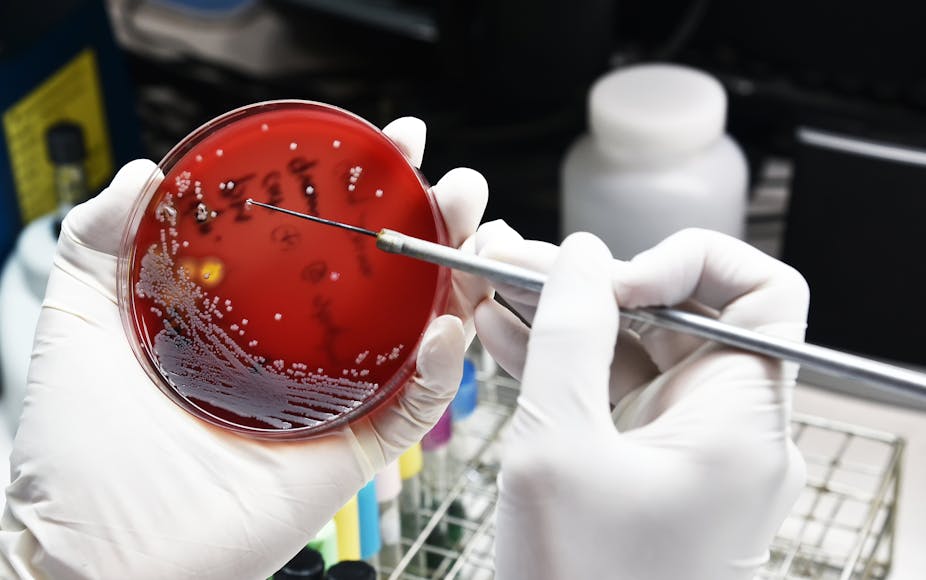The rise of drug-resistant infections is one of the biggest global threats to health, food security and development. Antibiotic-resistant superbugs were estimated to kill 1.27 million people in 2019, and the UN projects that drug-resistant diseases could cause 10 million deaths a year by 2050.
In this episode of The Conversation Weekly podcast, we hear from a microbiologist at a hospital in Nigeria working on the frontlines against antibiotic resistance, and find out about the new scientific techniques, including artificial intelligence (AI), being deployed to find new potential antibiotics.
Nubwa Medugu began her medical career in 2008 working in a paediatric unit in Kano, northern Nigeria. A lot of the children had typhoid and had taken antibiotics for it, but had come to hospital because the drugs weren’t working. “The fact that a lot of patients have infections that are very difficult to treat, I didn’t know it was just the tip of the iceberg then,” she says.
Today, Medugu is a clinical microbiologist at the National Hospital Abuja in Nigeria’s capital, and also teaches microbiology at Nile University of Nigeria. Her work involves analysing the hospital’s lab results for drug-resistant infections, and “the problem seems to have gotten worse”. She says it’s now “almost impossible” to find infections that are not resistant to at least one antibiotic.
Medugu recently published research analysing the level of antibiotic resistance in hospitals in Nigeria, and the types of antibiotics that are proving least effective. What’s most worrying is the number of infections that are resistant even to antibiotics of last resort – those drugs used to treat cases where other antibiotics have failed. “If nothing works, carbapenems usually work, but in this research, resistance to the carbapenems was pretty high … over 60% resistant.”
Read more: Will we still have antibiotics in 50 years? We asked 7 global experts
The hunt for new antibiotics
Inequality and poverty are a big part of the problem. If people aren’t able to access vaccinations, diagnostic testing, medical advice and the right drugs if they’re infected, this can exacerbate antibiotic resistance. But even in a world where everybody had access to the healthcare they needed, bacteria would still develop resistance to antibiotics.
And so, as the problem deepens, the hunt continues on for new antibiotics. One of the scientists doing that searching is André Hudson, a professor of biochemistry at Rochester Institute of Technology in New York. He uses traditional bio-prospecting techniques to culture potential antibiotics from natural samples such as soil. But Hudson explains that others are now using new techniques to find potential antibiotic compounds.
With AI, it allows it to go faster. It provides us with things that we cannot even think about, or we don’t even know how to do yet in the lab.
Another approach is called metagenomics, which involves sequencing an entire community of bacteria found in an environmental sample, such as soil or even the human gut. “Rather than cherry-picking a particular bacteria, I extract all DNA that is present in the soil and sequence the entire community,” explains Hudson.
In September, a group of scientists in Germany, the Netherlands and the US published a paper announcing they’d discovered a potential antibiotic using this method called clovibactin, isolated from uncultured soil bacteria.
Find out more about the fight against antibiotic resistance, and the solutions on the cards, by listening to the full episode of The Conversation Weekly. A transcript is now available.
And read more about this topic in a special series, The dangers of antibiotic resistance, in which experts explore how we got here and the potential solutions.
This episode was written and produced by Mend Mariwany and Gemma Ware with assistance from Katie Flood. Eloise Stevens does our sound design, and our theme music is by Neeta Sarl. Gemma Ware is the executive producer of the show.
You can find us on X, formerly known as Twitter @TC_Audio, on Instagram at theconversationdotcom or via email. You can also subscribe to The Conversation’s free daily email here.
Listen to The Conversation Weekly via any of the apps listed above, download it directly via our RSS feed or find out how else to listen here.

